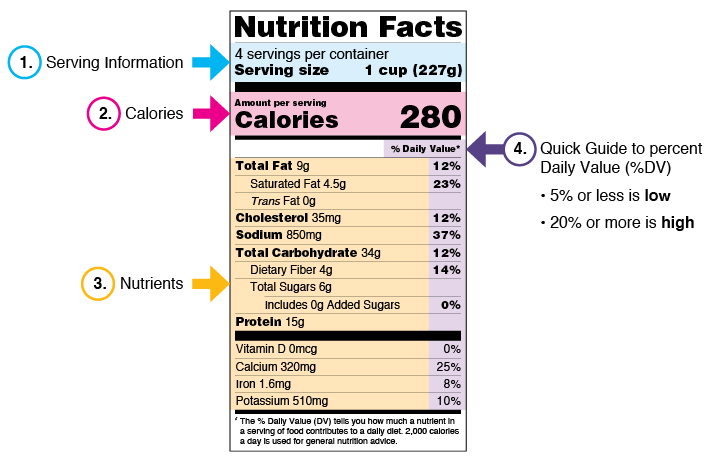7 out of 10 persons never actually take time to check the nutrition fact labels on foods when purchasing. According to the American Heart Association, ‘learning how to understand the use the nutrition facts labels can help you make healthier eating choices.’ Now this is very important because these labels let you know what quantity of cholesterol, calories, sugars, vitamins etc you’ll be putting inside your body. Many people exercise, think they’re eating healthy and wonder why after a week they lost 3 pounds but gained 7. I know, sad right? But it’s actually true. Since diet contributes to 80% of your fitness; well however that quotes goes. It is important to monitor the nutrition facts label on the foods you consume. A vitamins water for example; which we all would think contains vitamins and water has on average 40 grams of sugar. Oh, our favorite; fruits juices. These usually contain 35-100 grams of sugar per juice. It is also important to check how many servings are inside the product. Many of us like to think, if we buy a juice it’s ours and drink it all off. But realistically, the nutrition facts said 4 servings. Simple things like these help you to make more informed decisions to help you live a healthier life. In this blog we’ll be discussing the different food groups and the daily required value you ought to be consuming daily. If there’s a few you think we should cover feel free to let us know.
- Sugars:.
Now this is number one simply because of its detrimental effects along with its many other disguised names. Whenever you purchase a food item, you may not specifically see sugars. It may be labelled as artificial sweeteners, glucose, molasses etc. The daily requirement of sugars according to the AHA, is 6 tea spoons or 25 grams for women and 36 grams or 9 tea spoons for men” depending on the level of physical activity. A bottle of coke contains 63 grams of sugar; 3 times the amount of the daily value. If you eat a pizza along with a coke for lunch; you would literally spike your blood sugar levels while consuming empty calories. There it is important to monitor the level of your glucose intake by reviewing the nutrition facts on each item before consuming. For more foods loaded with sugars; checkout our top 20 list of foods high in sugars to avoid.
- Cholesterol:
 There are two types of cholesterol. These include LDL or low density lipoprotein which is the bad cholesterol. And, there’s the HDL or high density lipoprotein which is our friend; the good cholesterol. The body does produce cholesterol naturally and we get cholesterol from animal products and processed foods. It is important to note, vegetables and fruits does not contain cholesterol. When our bodies contain too much cholesterol, it begins to form a blockage in the arteries making it difficult for blood to flow through. Overtime this may cause blood clot, hardening of the arteries or even stroke. Exercise does help to reduce the amount of cholesterol levels in the blood. Nonetheless, by reviewing the nutrition facts on your food items will help you to control the amount of cholesterol you consume on a daily basis.
There are two types of cholesterol. These include LDL or low density lipoprotein which is the bad cholesterol. And, there’s the HDL or high density lipoprotein which is our friend; the good cholesterol. The body does produce cholesterol naturally and we get cholesterol from animal products and processed foods. It is important to note, vegetables and fruits does not contain cholesterol. When our bodies contain too much cholesterol, it begins to form a blockage in the arteries making it difficult for blood to flow through. Overtime this may cause blood clot, hardening of the arteries or even stroke. Exercise does help to reduce the amount of cholesterol levels in the blood. Nonetheless, by reviewing the nutrition facts on your food items will help you to control the amount of cholesterol you consume on a daily basis. - Vitamins:
 These are very important for optimum health. They help boost the immune system, enhance eye health, healthy skin, strong bones and teeth just to name a few. There are many vitamins to include A, B, B1, B2, B3, D, E, F and just about almost letters of the alphabets. Vitamin D, we can get from the sun which helps our bodies to perform certain functions. However for persons who never see or feel the sun; they can consume Vitamin D capsules. Our bodies does need a variety of vitamins and you can monitor the amount of vitamins you consume daily by checking out the nutrition facts on every food item you consume.
These are very important for optimum health. They help boost the immune system, enhance eye health, healthy skin, strong bones and teeth just to name a few. There are many vitamins to include A, B, B1, B2, B3, D, E, F and just about almost letters of the alphabets. Vitamin D, we can get from the sun which helps our bodies to perform certain functions. However for persons who never see or feel the sun; they can consume Vitamin D capsules. Our bodies does need a variety of vitamins and you can monitor the amount of vitamins you consume daily by checking out the nutrition facts on every food item you consume. - Protein: Unfortunately, despite how important it is to our body; we do not produce it naturally. Therefore, we have to get it in the foods we consume daily. Protein can be found in peanuts, beans, milk and many nuts and vegetables. The body doesn’t store protein, instead utilizes it once it’s available. This means every day you will have to up your protein intake. If you’re bodybuilder, you will need lots of protein daily to keep your muscles looking firm and strong. A protein deficit could mean loss of muscle mass anTd lead to serious problems. To ensure you get the right amounts of required daily protein; checkout the nutrition facts label on your foods.
- Carbohydrates: One of the largest food groups on the food pyramid due to it being the main source of our energy. These may include potatoes, oats, rice and bread etc. Though it does play an important role in our diet; consuming too much carbohydrates can have adverse effects. As you may know, carbohydrates break down in to sugar or glucose to be used by the body. The nutrition facts may show carbohydrates and sugars separately; however when inside the body, they convert to glucose. Ensure to review the nutrition facts labels to control the amount of carbohydrates you consume daily.
- Fats and oils:
 Many people tend to associate fats and oils as negative; the main cause to being overweight and obesity. However this is not the case. Once eaten in moderation, fats and oils help the body to perform its many functions. It’s only when eaten in excessive amounts such a deep fried chicken and fries etc; it becomes harmful to the body. The fats we consume are used as a secondary energy source other than carbohydrates. It also contributes to keeping us warm during the cold seasons. The required daily value of fats and oils are 44 grams to 77 grams but if you’re not too careful; you could find yourself going overboard very easily. The best sources of fats and oils are nuts and vegetables such as avocados. We cannot forget fish such as salmon, Tuna and sardine.
Many people tend to associate fats and oils as negative; the main cause to being overweight and obesity. However this is not the case. Once eaten in moderation, fats and oils help the body to perform its many functions. It’s only when eaten in excessive amounts such a deep fried chicken and fries etc; it becomes harmful to the body. The fats we consume are used as a secondary energy source other than carbohydrates. It also contributes to keeping us warm during the cold seasons. The required daily value of fats and oils are 44 grams to 77 grams but if you’re not too careful; you could find yourself going overboard very easily. The best sources of fats and oils are nuts and vegetables such as avocados. We cannot forget fish such as salmon, Tuna and sardine. - Sodium:
 Salt as we all know is the cause of high blood pressure! Wrong! It is too much salt in combination with a lack of exercise and poor diet is what contributes to high blood pressure. Salt is good. The body utilizes salt to enhance blood flow, normalize blood pressure along with the many other health benefits salt has to offer. Now, almost everything you eat may contain salt or sodium therefore it is important to review the nutrition facts on the items you consume before eating. The daily intake of sodium accoding to the FDA is 2,300 mg or 1 tea spoon. To help reduce your sodium intake, you can request no salt on food items which typically would require salt; such as our favorite; well your favorite, FRENCH FIRES.
Salt as we all know is the cause of high blood pressure! Wrong! It is too much salt in combination with a lack of exercise and poor diet is what contributes to high blood pressure. Salt is good. The body utilizes salt to enhance blood flow, normalize blood pressure along with the many other health benefits salt has to offer. Now, almost everything you eat may contain salt or sodium therefore it is important to review the nutrition facts on the items you consume before eating. The daily intake of sodium accoding to the FDA is 2,300 mg or 1 tea spoon. To help reduce your sodium intake, you can request no salt on food items which typically would require salt; such as our favorite; well your favorite, FRENCH FIRES. - Calcium:
 Though this one is not on the food pyramid, it is important and is worth mentioning. Calcium is very important to our body for strong bones, teeth, eyes and enhanced brain function. We get calcium from eggs, milk, oats; well you can say most white foods tend to have some level of calcium in them. A calcium deficit may lead to osteoporosis, weak teeth and bones along with other health conditions and diseases. It is wise to review the nutrition facts of every food item you eat to ensure you are consuming your daily required levels of calcium.
Though this one is not on the food pyramid, it is important and is worth mentioning. Calcium is very important to our body for strong bones, teeth, eyes and enhanced brain function. We get calcium from eggs, milk, oats; well you can say most white foods tend to have some level of calcium in them. A calcium deficit may lead to osteoporosis, weak teeth and bones along with other health conditions and diseases. It is wise to review the nutrition facts of every food item you eat to ensure you are consuming your daily required levels of calcium.
In this blog, we discussed the importance of reviewing the nutrition facts label on the food items you consume daily. This will not only help you to reach your daily required goals but will also ensure you do not go over limit on the different food and minerals. On a daily basis, it can be very easy to consume excessive amounts of sugars. In fact so much sugars that you gain more weight than you lost in a week at the gym. Vice-versa for the different food groups. To help yourself stay on target, create a diet plan that you follow daily. To lose weight, practice a healthy diet with lots of fruits and vegetables. Ensure to review the nutrition facts so there are no hidden ingredients that will take you farther away from achieving your goals. As always, if you loved this article let us know in the comments below also share it with your friends and family.














